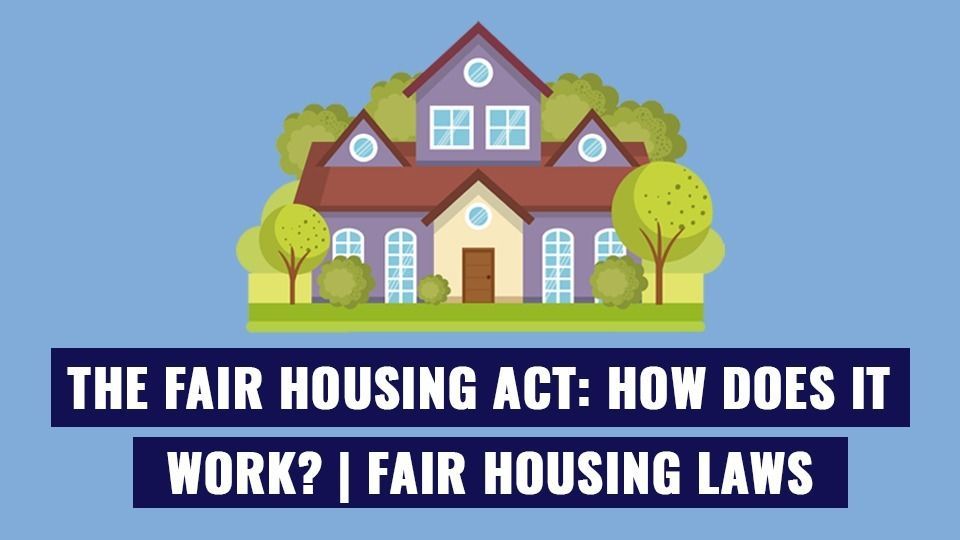Fair Housing Act: How Does it Work?

The Fair Housing Act is a crucial legislation promoting equal opportunity. It prohibits discrimination in housing. Understanding fair housing laws helps us see their importance and how they affect society.
History of Fair Housing Laws
The Fair Housing Act enacted in 1968 ended widespread racial segregation and discrimination in housing. African Americans and other minority groups faced significant barriers when securing housing in certain neighborhoods.
The civil rights movement emerged as a response to this injustice, advocating for fair housing and equal rights. The Fair Housing Act stopped discrimination based on factors such as
- Race
- National origin
- Sexual orientation
- Disability
- Color
- Religious organizations
- Family status
- Age
Key Provisions of the Fair Housing Act
The Fair Housing Act protects several classes of individuals from housing discrimination. These include race, color, national origin, religion, sex, familial status, and disability.
The Act covers most housing issues, including
- Residential sales
- Rental of housing
- Financing
- Advertising
It stops unfair practices like redlining, discriminatory lending, steering, blockbusting, and not helping people with disabilities.
Exceptions and exemptions to the Act exist, but they are limited. Certain buildings and houses are exempt from the Fair Housing Act. These include properties with four or fewer owner-occupied units.
Houses that individuals renting or buying a home without an agent also do not have coverage. Certain organizations and private clubs are exempt from the Act. However, it is crucial to note that most housing falls within the Act’s scope and is subject to its regulations.
Enforcement and Oversight of the Fair Housing Act
The U.S. Department of Housing and Urban Development (HUD) is vital in creating and enforcing the Fair Housing Act.
If you believe you have experienced housing discrimination, you can file a complaint with HUD. HUD will investigate the complaint and engage in a process to resolve the issue. State and local fair housing agencies also play a role in enforcing fair housing laws and ensuring compliance.
Landmark Fair Housing Cases
Several significant court cases have shaped the interpretation of fair housing law and its implementation. These cases have profoundly impacted federal fair housing practices and policies.
Shelley v. Kraemer
Shelley v. Kraemer (1948) determined that racial covenants, which limited property sales to certain races or ethnicities, were invalid.
Texas Department of Housing and Community Affairs v. Inclusive Communities Project
A famous case, Texas Department of Housing and Community Affairs v. Inclusive Communities Project (2015), created the idea of disparate impact. The case Texas Department of Housing and Community Affairs v. Inclusive Communities Project (2015) introduced the concept of disparate impact. Disparate impact refers to the idea that actions with unfair consequences can violate the Fair Housing Act, regardless of intent.
Recent Developments and Challenges in Fair Housing
While we have made significant progress in fair housing, we are now facing new challenges. One such challenge is disparate impact, which refers to practices that may not be explicitly discriminatory but still have discriminatory effects. This concept has important implications for fair housing enforcement and the need to address unfair practices in the system.
Online housing platforms can discriminate by using algorithms and filters. These discriminatory practices prevent certain groups from accessing housing opportunities. As a result, concerns about digital discrimination arise when people refuse to rent or sell housing.
Efforts to strengthen fair housing laws and expand protections remain priorities. Advocacy groups, lawmakers, and communities are working to address these challenges and ensure fair housing for all. However, we still need to address several problems.
One of these problems is the lack of sufficient resources for enforcing laws. Additionally, there is a lack of awareness among people about these issues. Lastly, marginalized groups continue to face discrimination.
Promoting Fair Housing: Public Awareness and Education
Public awareness and education are crucial in promoting fair housing rights and responsibilities. People must know their rights under the Fair Housing Act and be able to identify and report housing discrimination.
There are resources like workshops and online guides to help people understand fair housing laws and how to navigate them. Real estate agents and housing providers must ensure fair housing and give information to clients for equal opportunity.
Fair Housing and Affirmatively Furthering Fair Housing (AFFH)
Affirmatively Furthering Fair Housing (AFFH) is a concept that aims to address housing segregation and promote inclusive communities. It requires recipients of federal funding to take proactive steps to eliminate barriers to fair housing and create equal housing opportunities.
AFFH recognizes that fair housing extends beyond individual acts of discrimination and seeks to address unfair practices. However, implementing AFFH has faced challenges and debates, particularly regarding the best approaches and strategies.
Fair Housing and Social Justice
Broader social justice issues intricately link to fair housing. Housing discrimination denies people the right to choose where they live and keeps unfair practices in marginalized communities. Housing discrimination impacts areas such as
- Education
- Employment
- Healthcare.
Understanding the connection between fair housing and other civil rights act is important. Progress made in one area can have positive effects on others.
Future of Fair Housing
The future of fair housing holds the potential for further progress and advancements in laws and policies. As technology continues to evolve, it can play a significant role in advancing fair housing practices.
For example, data analytics and machine learning algorithms can help identify discriminatory patterns and provide evidence for enforcement actions. Efforts to eradicate housing discrimination and promote equal opportunity must continue, addressing emerging challenges and adapting to changing societal needs.
The Fair Housing Act fights housing discrimination and promotes equal opportunity, making it an important tool. Understanding its historical background, key provisions, enforcement mechanisms, and prospects is essential for ensuring fair housing for all.
Sell Your House Fast in St. Louis, Missouri
If you need to sell your house fast but don’t want the hassle of a traditional home sale, contact Klamen Real Estate Buyers. We buy houses as-is. No repairs are needed. Avoid closing costs and realtor commissions. Close in as little as seven days. Call 314-721-6800 and get a fast cash offer from our local home buyers in Missouri.
Get Your Fair & Honest All-Cash Offer Today! No Obligations!
We will get back to you as soon as possible.
Please try again later.
By submitting this form, you agree to our Conditions of Use and Privacy Policy. You may receive both automated and personal text messages. Reply STOP at anytime to opt-out.


